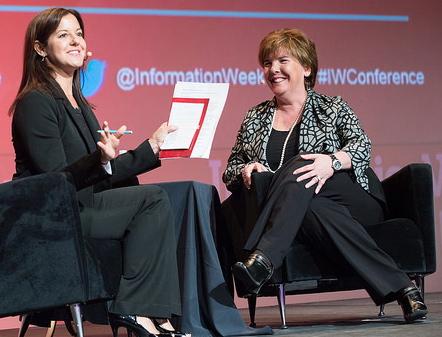Tim Cook: Customers, Not Companies, Should Control Their Data
Apple CEO Tim Cook told a crowd that consumer data should be theirs to keep and not used to make businesses money. He targeted Google and Facebook without mentioning them.


7 Bold Tech Ideas That Will Make You Uncomfortable
7 Bold Tech Ideas That Will Make You Uncomfortable (Click image for larger view and slideshow.)
Apple's CEO Tim Cook gave an impassioned speech on defending consumer privacy and encryption while being honored for corporate leadership by the Electronic Privacy Information Center (EPIC) at their Champions of Freedom event in Washington on June 2.
In addition to leveling charges at companies who use their users' data for profit -- he didn't name names, but Google, Facebook, and Twitter would all fit into that business model -- he blasted Washington politicians and claimed taking away encryption would have a "chilling effect" on Americans' First Amendment rights.
"Like many of you, we at Apple reject the idea that our customers should have to make tradeoffs between privacy and security," Cook told the audience Tuesday from a video link in Silicon Valley, according to a TechCrunch report of the event.
"We can, and we must provide both in equal measure. We believe that people have a fundamental right to privacy. The American people demand it, the constitution demands it, morality demands it," Cook added.
EPIC, an independent, non-profit research center located in the nation's capital, was founded to protect privacy, freedom of expression, democratic values, and to promote public debate and opinion in decisions regarding the future of the Web, and routinely files amicus briefs in federal courts.
"We believe the customer should be in control of their own information," Cook continued. "You might like these so-called free services, but we don't think they're worth having your email, your search history and now even your family photos data mined and sold off for god knows what advertising purpose. And we think some day, customers will see this for what it is."
Turning to encryption, Cook accused some in Washington of trying to attach civil liberties by undermining citizens' ability to encrypt their personal data.
"We think this is incredibly dangerous," Cook said. "We've been offering encryption tools in our products for years, and we're going to stay on that path. We think it's a critical feature for our customers who want to keep their data secure."
[Read about what CIOs need to know about encryption and the NSA.]
This is not the first time Apple's CEO has spoken up about privacy issues.
He addressed the topic during an appearance on Charlie Rose, and when he was speaking at this year's Summit on Cybersecurity at Stanford, which was coordinated by the White House and featured a keynote speech by President Obama. In addition, Cook wrote an open letter to Apple users in the wake of the celebrity hacking incidents.
The letter was posted on Apple's new Privacy page, which Cook said was established to explain how the company handles a user's personal information, what they do and don't collect, and why.
"I want to be absolutely clear that we have never worked with any government agency from any country to create a backdoor in any of our products or services. We have also never allowed access to our servers. And we never will," he wrote.
"Our commitment to protecting your privacy comes from a deep respect for our customers. We know that your trust doesn't come easy. That's why we have and always will work as hard as we can to earn and keep it."
About the Author
You May Also Like






